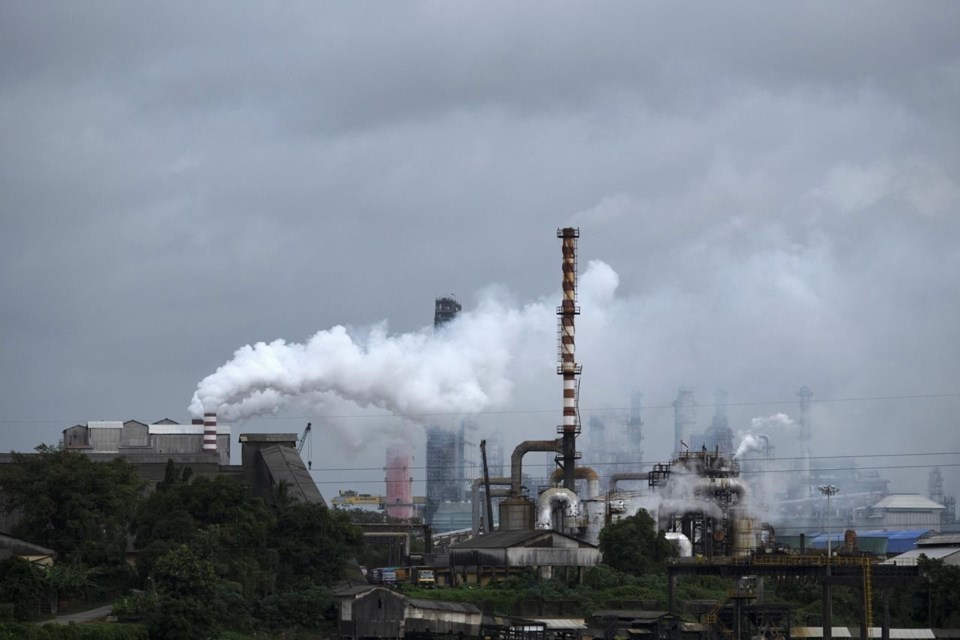SHARM EL-SHEIKH, Egypt (AP) — The world’s burning of coal, oil and natural gas this year is putting 1% more heat-trapping carbon dioxide in the air than last year, bad news for the fight against but with an odd twist, according to scientists who track emissions.
China’s carbon pollution was down 0.9% this year compared to 2021, while emissions in the United States were 1.5% higher, said a study by scientists at released early Friday at international climate talks in Egypt. Both are opposite long-term trends. American emissions had been steadily dropping while Chinese emissions had been rising — until this year.
In both cases, it is a reaction to the pandemic and perhaps a bit of the energy crisis created by Russia’s invasion of Ukraine, study lead author Pierre Friedlingstein of the University of Exeter told The Associated Press. He said those two factors make this year’s data chaotic and hard to draw trends from. China’s lockdown in 2022 to try to control renewed COVID-19 is a major factor in that country’s drop, he said.
Much of the jump was in transportation — cars and air travel — with people’s limits on travel during the pandemic wearing off, Friedlingstein said.
While global carbon pollution is still increasing, it isn’t increasing at as fast a rate as 10 or 15 years ago. But overall scientists said this is bad news because it is pushing Earth closer to hitting and then passing the globally adopted threshold of limiting warming to Celsius (2.7 degrees Fahrenheit) since pre-industrial times.
“It means we better get ready to blow past the target and enter a world that humans have never experienced,’’ said Princeton University climate scientist Michael Oppenheimer, who wasn’t part of the research team.
Friedlingstein’s team — along with other scientific reports — figure Earth can only put 380 billion metric tons (419 U.S. tons) of carbon dioxide into the air before Earth reaches the 1.5-degree mark. That’s about 9 to 10 years worth of emissions, meaning the globe will likely hit that point around 2031 or 2032.
“The time for 1.5 is running out,” Friedlingstein said.
“This is bad news,” said Brown University climate scientist Kim Cobb, who wasn’t part of the research team. “It’s hard to see any silver lining in rising emissions, when we must cut emissions in half by 2030 to keep global warming to an absolute minimum.”
In 2022, the world is on track to put 36.6 billion metric tons (40.3 billion U.S. tons) of carbon dioxide in the air from energy and cement use, the study calculated. That’s the weight of the Great Pyramid of Giza in carbon dioxide spewed every 75 minutes.
In addition to the United States seeing emissions go up, India had a 6% increase in 2022, while Europe had a 0.8% drop. The rest of the world averaged a 1.7% carbon pollution jump.
Pollution from coal jumped 1% from last year, for oil it went up 2% and for natural gas it went down 0.2%, the report said. About 40% of the carbon dioxide comes from burning coal, 33% from oil and 22% from natural gas, Friedlingstein said.
The team calculates emissions levels through the early fall using data provided by top carbon-emitting countries, including the U.S., China, India and Europe, and then makes projections for the rest of year.
While there are limitations to projections, Oppenheimer said: “This is the A-team on CO2 emissions and the carbon cycle. They know what they’re doing.”
Carbon emissions from fossil fuels plunged 5.3% in 2020 but last year, spurred by China, and now have completely erased the pandemic drop and are back on a slowly rising trend, Friedlingstein said.
The team also looks at overall emissions, including the effects of land use. When land use is factored in, emissions are flat, not rising slightly, he said.
—-
Follow AP’s climate and environment coverage at
___
Follow Seth Borenstein on Twitter at
___
Associated Press climate and environmental coverage receives support from several private foundations. See more about AP’s climate initiative . The AP is solely responsible for all content.
Seth Borenstein, The Associated Press




